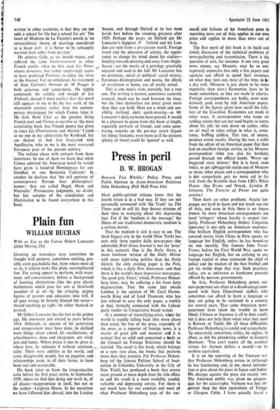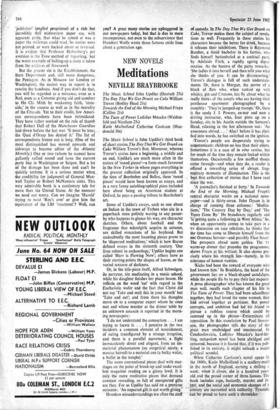Between Two Worlds : Policy, Press, and Public Opinion in
Asian-American Relations John Hohenberg (Pall Mall Press 64s)
Press in peril
D. W. BROGAN
Most public-spirited citizens know that the fourth estate is in a bad way. If they are not personally connected with 'the Trade' (as The Times used to call it), they devote minutes of their time to worrying about this depressing fact. For if the 'medium is the message,' the illness of our traditional democratic medium is a serious matter.
That the medium is sick is easy to see. The third biggest city in the world (New York) has .. now only three regular daily newspapers (the admirable Wall Street Journal is not the 'press' in this context). One is the Daily News, a more lowbrow version of the Daily Mirror with more right-wing politics than the Daily Sketch; the only evening paper is the Post, which is like a daily New Statesman; and then there is the world's most impressive newspaper, 'the good grey Times,' which, Professor Hohen- berg hints, may be suffering a bit from fatty degeneration. That the same fate awaits London is the opinion of Mr Cecil Harms- worth King and of Lord Thomson, who has just refused to save the only paper, a weekly at that, formally connected with the Labour party (under its Cooperative brand name).
At a moment of intensifying crisis, when the world is rapidly falling back into more chaos than usual, the fate of the press, especially of the press as a reporter of foreign news, is a matter of great pith and moment and it is natural that so solid and concerned a body as the Council on Foreign Relations should be worried. The result is this book, which belongs to a very rare class, the books that perform more than they promise. For Professor Hohen- berg (of the famous Pulitzer School of Jour- nalism in Columbia University in the City of New York), has produced a book that covers more ground at more depth than the title offers us and the result is a most readable, candid, valuable and depressing survey. For there is not much here for our comfort and most of what Professor Hohenberg says of the suc- cesset and failures of the American press in reporting news out of Asia applies to our own presti and applies to more than news out of Asia.
The first merit of this book is its lucid and timely discussion of the technical problems of news-gathering and transmission. There is the question of cost, for instance. A not very good news source, say Moscow, may be so out- rageously expensive that only a few papers and
agencies can afford to spend their resources on what may turn out, most of the time, to be
a dry well. (Moscow is just about to be more expensive than ever.) Economies have to be made somewhere, so they are made in salaries. Foreign correspondents are badly, even scan- dalously paid, even by rich American papers. Some of the figures given here recall the folk- lore of the Guardian. Economies are made in other ways. A correspondent who keeps on cabling stories that are not used begins to worry about his job; he cuts down on cables, relies
on air mail or takes refuge in what is, some- times, baffling cablese. This can, of course,
produce comic results. During the war, a cable from the editor of an American paper that then had an excellent foreign service, to his Moscow correspondent (who was also his brother),
passed through my official hands. 'Worst up- buggered story history.' But it is hard, even today, to get upbuggered stories out of Moscow
or many other places and a correspondent who is not sympathetic gets no more aid in his
task from the Kremlin than from LBJ's White House. (See Evans and Novak, Lyndon B. Johnson, The Exercise of Power not quite passim.) -
Then there are other problems. Asiatic lan- guages are hard to learn and not much use out of Asia, and even in Asia there is no lingua franca. So most American correspondents use local 'stringers' whose loyalty is suspect (un- justly, Professor Hohenberg thinks). Linguistic ignorance is not only an American weakness. One brilliant English correspondent who has covered stories from China to Peru speaks no language but English, unless he has boned-up on, one recently. The famous John Foster Fraser, before the First World War, spoke no language but English, but on arriving in any foreign capital at once contacted the chief of police and the madam of the best brothel and got his inside dope that way. Such practices, today, are as unknown as handsome presents offered by nervous governments.
In Asia, Professor Hohenberg points out, newspapermen are often at a disadvantage com- pared with State Department staffers who sometimes can afford to learn a language as they are going to be stationed in a country for several years. That some American news- papermen have taken the trouble to learn Hindi, Chinese or Japanese is all to their credit, but it does not help them when what they need is Korean or TamiL On all these difficulties, Professor Hohenberg is candid and sympathetic.
To excessively censorious critics, he replies, in effect, as did the plundering soldier to General Sherman: 'You can't expect all the cardinal virtues for thirteen dollars a month'—or its modern equivalent.
It is on the reporting of the Vietnam war that Professor Hohenberg zeroes in (although he has fascinating and, to me, novel informa-
tion to give about the press in Japan and India). Rh charges against the press are mainly two• The American public was given no prepara- tion for the catastrophe. Vietnam was less im- portant than the then equivalents of Twiggy or Glasgow Celtic. I have actually heard a
•
publisher (anglice proprietor) of a rich but incredibly dull midwestern paper say, with apparent pride, that what he aimed at was a paper the milkman could read. So stories were not printed, or were hacked about or reversed. It is evident that Professor Hohenberg's pet aversion is the Time method of 'reporting,' but the worst example of balling-up a story is taken from the archis es of Newsweek But the greater sin is the Establishment, the State Department and, still more dangerous, the Pentagon. As in Moscow (or London or Washington), the easiest way to report is to rewrite the handouts. And if you don't do that, you will be regarded as a nuisance, even as a Red, even as a Commie giving aid and comfort to Ho Chi Minh by weakening faith, 'state- side,' in the success as well as in the morality of the Crusade. Yet to their credit, few Ameri- can correspondents have been intimidated. They have rather worked on the rule of thumb that Robert Dell of the Manchester Guardian laid down before the last war. 'It must be true; the Quai d'Orsay has denied it.' The list of correspondents frozen out is long. (One of the most distinguished has moved upwards and sideways to become editor of the Atlantic Monthly.) One or two (whom he names) have gallantly rallied round and issue the current party line in Washington or Saigon. But a lot of the damage has been done and can't be quickly undone. It is a serious matter when the credibility (or judgment) of General Max- well Taylor or Robert McNamara sinks. This very admirable book is a cautionary tale for more than the United States. At the moment we need not worry. Can we imagine 'Harold' trying to twist `Roy's arm' or give him the equivalent of the LBJ 'treatment'? Well, can you? A great many stories are upbuggered in our newspapers today, but that is due to mere incompetence, not even to the subservience that Humbert Wolfe wrote those famous snide lines about a generation ago.































 Previous page
Previous page